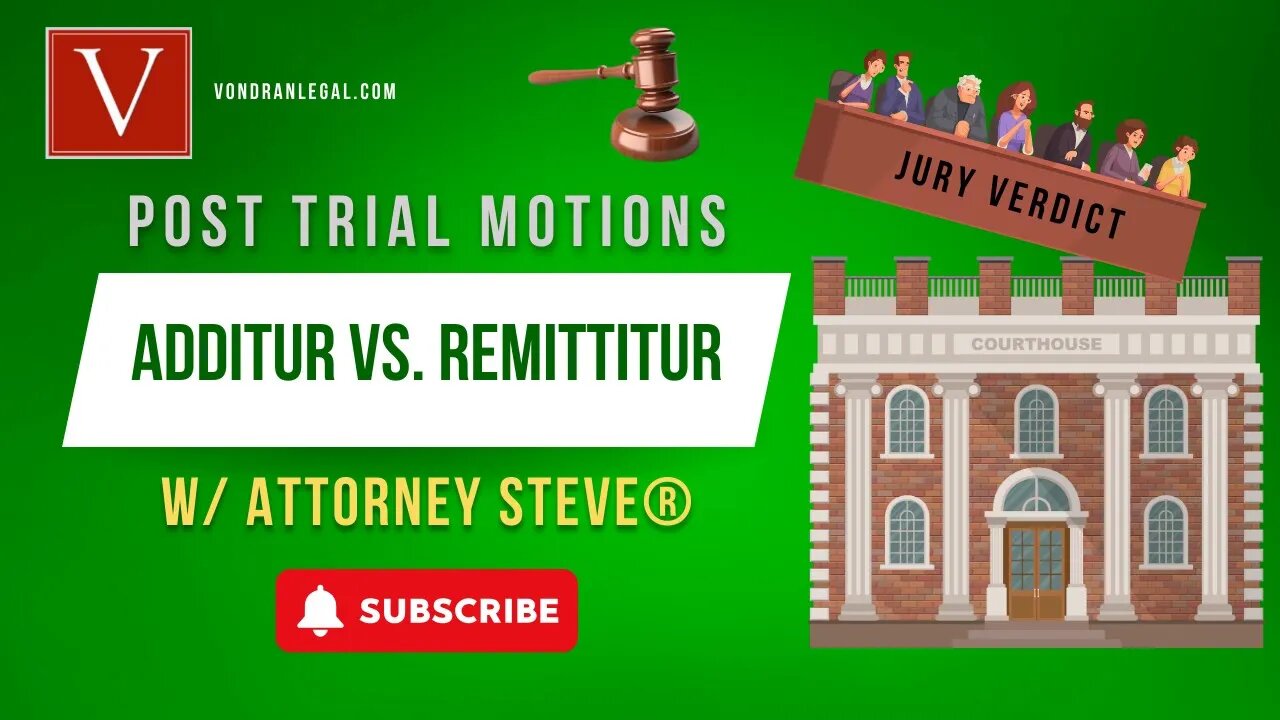Premium Only Content

Additur vs. Remittitur explained by Attorney Steve
http://www.vondranlegal.com - Vondeezy, Law Made EZ! Feel free to share this video! Thanks for watching and don't forget to SUSBCRIBE, LIKE and MAKE A COMMENT!!
WHAT IS THE DIFFERENCE BETWEEN A MOTION FOR ADDITUR VS. REMITTITUR
A motion for additur and a motion for remittitur are legal procedures related to jury awards in civil cases. They are typically used when one party believes that the jury's award is either too low (for a motion for additur) or too high (for a motion for remittitur) and seeks to have the court adjust the amount of damages awarded. Here's the difference between the two:
Motion for Additur:
Additur is a legal remedy used when a party believes that the jury's award is insufficient, and they want the court to increase the amount of damages. In this scenario, the party who is dissatisfied with the jury's verdict requests the court to add an additional amount to the jury's award. The judge has the authority to grant or deny the motion for additur. If granted, the judge will increase the amount of damages awarded by the jury.
Motion for Remittitur:
Remittitur is the opposite of additur and is used when a party believes that the jury's award is excessive or that the jury made an improper verdict. In this case, the dissatisfied party seeks to have the court reduce the amount of damages awarded by the jury. Similar to additur, it's up to the judge to decide whether to grant or deny the motion for remittitur. If granted, the judge will reduce the amount of damages awarded by the jury.
These motions are typically used when there is a clear and significant disparity between the jury's award and the evidence presented during the trial. The party making the motion must present a persuasive argument to convince the judge that an adjustment is necessary.
It's important to note that the availability and procedures for additur and remittitur can vary by jurisdiction, and not all legal systems allow for these motions. Additionally, the judge's decision to grant or deny such a motion is generally discretionary and based on the specific facts and circumstances of the case.
If the case is in federal court (ex. a copyright, trademark, or trade secret case), look to FRCP Rule 59 which permits a motion to amend or alter a judgment.
-
 11:16
11:16
Attorney Steve® Legal News
1 year ago6
56 -
 LIVE
LIVE
Wendy Bell Radio
4 hours agoLike Sheep To Slaughter
7,453 watching -
 LIVE
LIVE
DML
42 minutes agoDML LIVE: NYC Goes Socialist: Mamdani’s Victory
565 watching -
 DVR
DVR
Chad Prather
13 hours agoTruth on Trial: When Fear Meets Faith
21.3K13 -
 LIVE
LIVE
LFA TV
12 hours agoLIVE & BREAKING NEWS! | WEDNESDAY 11/5/25
3,864 watching -
 LIVE
LIVE
The Chris Salcedo Show
12 hours agoDems Win In Dem States...And They Celebrate?
683 watching -
 1:04:43
1:04:43
Crypto Power Hour
10 hours ago $0.03 earnedPsychology Of Crypto Market Cycles
21.9K6 -
 9:58
9:58
Clintonjaws
12 days ago $0.11 earnedKaroline Leavitt's Response To 'The View' Host's Nasty Attacks Is Perfect
12.2K13 -
 24:23
24:23
World2Briggs
19 hours ago $0.01 earnedTop 10 Towns You Can Retire on $1900 a month in the Pacific North West.
8.56K8 -
 21:23
21:23
Lady Decade
16 hours ago $0.03 earnedThe Lost Sega Neptune Console Refuses To Die !
14.3K4